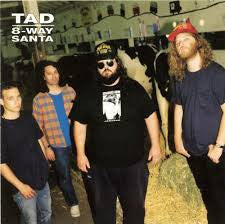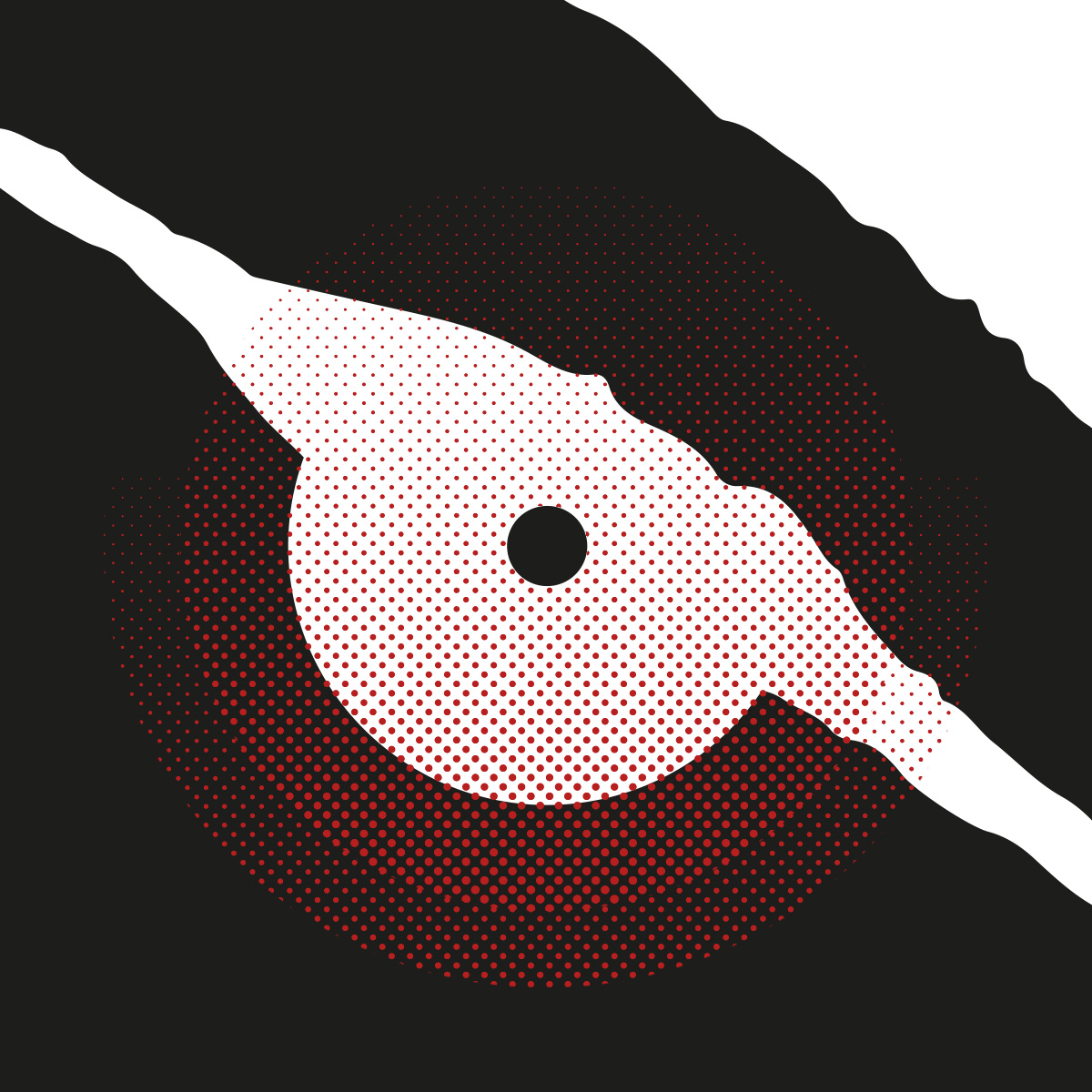
Sub Pop
TAD - 8-Way Santa LP
$39.95
Includes d/l code.
Remastered, with lyrics, interviews and full size poster.
Highly recommended.
No band that rose out of the Pacific Northwest music scene of the late ’80s was as committed to the idea of sonic punishment as TAD. According to guitarist Gary Thorstensen, the initial concept for the band, presented in their first rehearsal, was “to sound like an eight-cylinder car, running on seven cylinders.” That’s exactly what the quartet’s 1989 debut God’s Balls and the following year’s Salt Lick EP sound like: blisteringly loud and raw SST/ Touch & Go-style noise rock set to a molten Black Sabbath tempo. Both are extremely evocative of the band’s live performances from the era, but the Satan-worshipping, chainsaw-wielding backwoods maniacs (not really) in TAD were too musically restless to settle into formula.
Almost 25 years after its release, the controversy surrounding 8-Way Santa’s infamous original album art, Sub Pop’s ingenious/ill-conceived marketing and promotion strategy, and the multiple lawsuits that crippled the album’s commercial prospects remains the dominant narrative. There’s a lot to sort through in this cavalcade of catastrophes—a fair amount of screen time in the provocative TAD documentary Busted Circuits and Ringing Ears is devoted to just getting the facts behind 8-Way Santa straight. In short: Pretty much everything that could go wrong did, in fact, go wrong, and the process of making the record drove drummer Steve Wied out and put a hard stop to the original incarnation of the band.
In some respects, 8-Way Santa is the outlier in TAD’s catalog, an unapologetically melodic and unpretentious collection of biker-rock anthems. Perhaps that’s selling it short. The album’s bookends—“Jinx” and “Plague Years”—were way ahead of the curve of what was going on with underground music in the year punk broke. “Flame Tavern” and “3-D Witch Hunt” feature sung (as opposed to growled) vocals, two of the more overtly “poppy” songs on an album that openly flirts with traditional pop song structures throughout. The shift on 8-Way Santa was every bit as dramatic as Die Kreuzen’s October File or Head of David’s Dustbowl, in terms of presenting the band in a shockingly different context; some TAD fans—and even some members of the band—continue to have an uneasy relationship with the album because of it.
Part of the band’s genius was the overall sense of menace and dread conveyed by guitarist/vocalist Tad Doyle’s and bassist Kurt Danielson’s perversely humorous lyrics. 8-Way Santa suggests a 50/50 split between strange-but-true autobiographical narratives and equally vivid confabulations, with tracks like “Jack Pepsi” (a.k.a. “Jack”) blurring the lines between both. In truth, the band’s entire catalog (at least through 1993’s Inhaler) is worth revisiting, but we salute 8-Way Santa for taking a basic canvas of ugliness and transforming it in to something groovy and hypnotic. It’s one of the definitive albums of Sub Pop’s early years, and its charms were immediately apparent: Entertainment Weekly went as far as to suggest that the world would be a better place with less Rick Astleys and more acts like TAD. Hear, hear!
- Nick Green
Remastered, with lyrics, interviews and full size poster.
Highly recommended.
No band that rose out of the Pacific Northwest music scene of the late ’80s was as committed to the idea of sonic punishment as TAD. According to guitarist Gary Thorstensen, the initial concept for the band, presented in their first rehearsal, was “to sound like an eight-cylinder car, running on seven cylinders.” That’s exactly what the quartet’s 1989 debut God’s Balls and the following year’s Salt Lick EP sound like: blisteringly loud and raw SST/ Touch & Go-style noise rock set to a molten Black Sabbath tempo. Both are extremely evocative of the band’s live performances from the era, but the Satan-worshipping, chainsaw-wielding backwoods maniacs (not really) in TAD were too musically restless to settle into formula.
Almost 25 years after its release, the controversy surrounding 8-Way Santa’s infamous original album art, Sub Pop’s ingenious/ill-conceived marketing and promotion strategy, and the multiple lawsuits that crippled the album’s commercial prospects remains the dominant narrative. There’s a lot to sort through in this cavalcade of catastrophes—a fair amount of screen time in the provocative TAD documentary Busted Circuits and Ringing Ears is devoted to just getting the facts behind 8-Way Santa straight. In short: Pretty much everything that could go wrong did, in fact, go wrong, and the process of making the record drove drummer Steve Wied out and put a hard stop to the original incarnation of the band.
In some respects, 8-Way Santa is the outlier in TAD’s catalog, an unapologetically melodic and unpretentious collection of biker-rock anthems. Perhaps that’s selling it short. The album’s bookends—“Jinx” and “Plague Years”—were way ahead of the curve of what was going on with underground music in the year punk broke. “Flame Tavern” and “3-D Witch Hunt” feature sung (as opposed to growled) vocals, two of the more overtly “poppy” songs on an album that openly flirts with traditional pop song structures throughout. The shift on 8-Way Santa was every bit as dramatic as Die Kreuzen’s October File or Head of David’s Dustbowl, in terms of presenting the band in a shockingly different context; some TAD fans—and even some members of the band—continue to have an uneasy relationship with the album because of it.
Part of the band’s genius was the overall sense of menace and dread conveyed by guitarist/vocalist Tad Doyle’s and bassist Kurt Danielson’s perversely humorous lyrics. 8-Way Santa suggests a 50/50 split between strange-but-true autobiographical narratives and equally vivid confabulations, with tracks like “Jack Pepsi” (a.k.a. “Jack”) blurring the lines between both. In truth, the band’s entire catalog (at least through 1993’s Inhaler) is worth revisiting, but we salute 8-Way Santa for taking a basic canvas of ugliness and transforming it in to something groovy and hypnotic. It’s one of the definitive albums of Sub Pop’s early years, and its charms were immediately apparent: Entertainment Weekly went as far as to suggest that the world would be a better place with less Rick Astleys and more acts like TAD. Hear, hear!
- Nick Green




